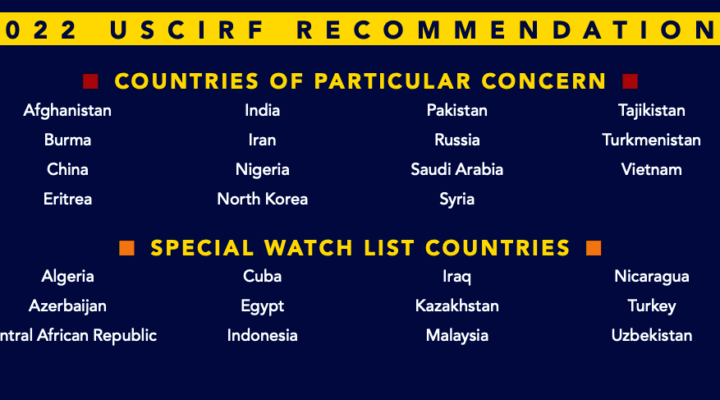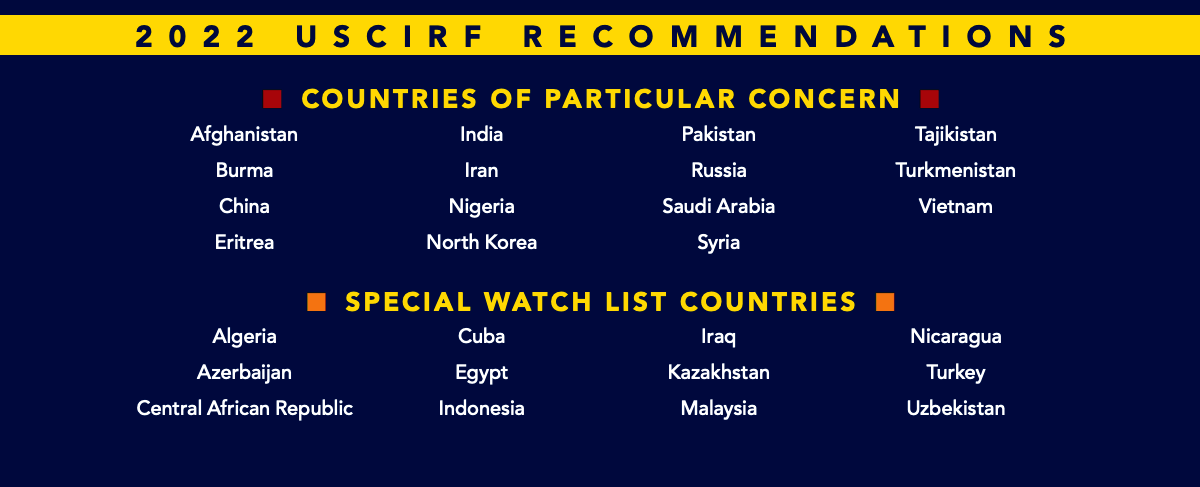Russia has spent recent years in diplomatic and economic hot water with the United States over its mounting human rights and religious freedom violations, including the persecution of Muslims, Jehovah’s Witnesses and Protestant Christians.
But the ongoing invasion of Ukraine has put Russia into an even deeper hole with humanitarian groups and nations concerned about the well-being of religious minorities caught in the path of Russian forces, according to officials with the U.S. Commission on International Religious Freedom.
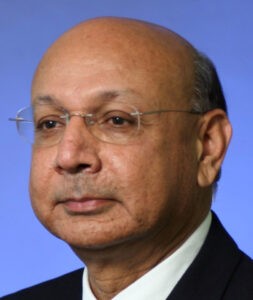
Khizr Khan
“USCIRF is concerned that Russia will extend its religious freedom abuses, as seen in occupied Crimea and Donbass, to future occupied territories. Russia has deliberately shelled houses of worship sheltering civilians during its current military action. We strongly condemn that abuse violation of human rights, violation of religious freedom, and we are keenly, like the rest of the world, observing these Russian atrocities,” Commission member Khizr Khan said during an April 25 press conference held to release the organization 2022 annual report.
The 91-page document assesses global threats to religious freedom and recommends national responses for the White House, U.S. State Department and Congress.
USCIR is a bipartisan agency created by the International Religious Freedom Act of 1998.
New recommendations
This year’s report recommends that five nations be added to the list of Countries of Particular Concern: Afghanistan, India, Nigeria, Syria and Vietnam.
If so designated by the State Department, those countries would join Burma, China, Eritrea, Iran, North Korea, Pakistan, Saudi Arabia, Tajikistan, Turkmenistan and Russia on the list of countries whose governments engage in or permit systematic and “particularly severe” violations of religious freedom.
Nations that exhibit slightly less serious violations are recommended for USCIRF’s Special Watch List, which currently includes Algeria, Cuba and Nicaragua. USCIRF’s 2022 report recommends adding Azerbaijan, the Central African Republic, Egypt, Indonesia, Iraq, Kazakhstan, Malaysia, Turkey and Uzbekistan.
The agency uses its Entities of Particular Concern category to designate terrorist groups and other non-state organizations known to be particularly hostile to religious freedoms.
USCIRF recommended seven groups be given that designation, including al-Shabaab in East Africa and Yemen, Boko Haram in Nigeria and several Islamic State factions in Africa.

Nadine Maenza
“To be an EPC, a non-state group must engage in particularly severe violations of religious freedom, be outside the control of a sovereign government, exercise significant political power and territorial control, and often employ violence in pursuit of its objectives,” USCIRF Chair Nadine Maenza explained.
The agency is currently monitoring numerous hot spots in Africa that may result in additional Countries of Particular Concern designations or additions to the watch list, she added. The recent removal of Sudan from the watch list, due to human and religious rights improvements beginning in 2019, is being re-considered in the wake of a military takeover of the country in 2021.
“The challenges are many, and they affect individuals, families and communities around the world,” Maenza said.
The problem with Russia
But Russia continues to present especially challenging problems. According to the USCIRF report, religious freedom conditions in Russia continued to deteriorate in 2021, due in part to new laws enabling President Vladimir Putin to persecute religious minorities.
“The Russian government views independent religious activity as a threat to stability and to its own control,” the report explains. “The government enforces laws that restrict religious freedom, including a 1996 religion law; a 2002 law on combating extremism; and more recent laws on blasphemy, ‘stirring up religious hatred,’ and ‘missionary activity.’ These vague laws give authorities broad powers to define and prosecute any religious speech or activity or to ban any religious literature they deem harmful.”
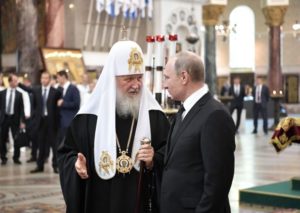
Vladimir Putin with Russian Orthodox Patriarch Kirill in 2019.
Putin signed amendments to those laws in April 2021 to place greater limits on the practices of religious minorities, tighten registration for faith groups and require foreign-born clergy to be certified in Russia.
“In 2021, the Russian government began applying the vague ‘undesirable organization’ label to religious entities, including four evangelical groups and several organizations linked to the Church of Scientology. Although the legal consequences of this designation remain unclear, it is widely perceived as a step toward an eventual ban on the peaceful religious activity of those targeted.”
And now reports from Ukraine suggest that Russia has been violently hostile toward non-Russian Orthodox churches, including Baptist congregations and leaders, since the invasion that began in February.
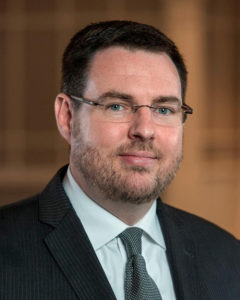
Elijah Brown
After a recent tour of portions of the nation, Elijah Brown, general secretary of the Baptist World Alliance, reported that close to 200 Baptist churches had been occupied by Russian troops and that all six Baptist churches in Mariupol had been destroyed by the invaders. He also reported the deaths of five Baptist leaders whose car was struck by a Russian bomb as they traveled to provide physical and pastoral care to war victims.
Other Protestants have been targeted, too, including Vitaliy Vinogradov, dean of the Slavic Evangelical Seminary in Kyiv, whose bullet-riddled body was found on a street in Bucha in early April after Russian forces withdrew.
Based solely on its 2021 track record, Russia merits additional targeted sanctions for its severe violations of religious freedom, the USCIRF report says. It also urges Congress to engage “with affected religious communities in Russia and occupied Ukraine and raise ongoing religious freedom issues through hearings, meetings, letters, congressional delegation trips abroad, or other actions for community representatives to inform the U.S. government and/or public of existing conditions.”
The challenge of Afghanistan
Despite these new challenges, the 2021 Taliban conquest of Afghanistan was so illustrative of the global threat to international freedom that USCIRF began its report with a discussion of the situation in that country.
“The Taliban’s victory was calamitous for many reasons, including the detrimental effect it had on religious freedom. USCIRF has long raised concern that the Taliban’s brutal application of its extremist interpretation of Sunni Islam violates the freedom of religion or belief of all Afghans who do not adhere to that interpretation, including Muslims and adherents of other faiths or beliefs,” according to the report.
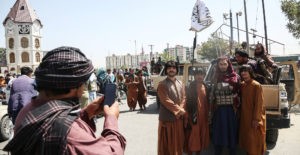
On Aug. 16, Taliban fighters pose for a photo in Kabul, Afghanistan. The Taliban (designated terrorist and banned in Russia) took over the capital city of Kabul on Aug. 15, sweeping to power in Afghanistan as President Ashraf Ghani resigned and fled abroad. (Stringer / Sputnik via AP)
“With the Taliban’s return to power, religious freedom conditions in Afghanistan, and the overall human rights situation, significantly deteriorated in 2021. Religious minorities faced harassment, detention and even death due to their faith or beliefs. The one known Jew and most Hindus and Sikhs fled the country. Christian converts, Baha’is, and Ahmadiyya Muslims practiced their faith in hiding due to fear of reprisal and threats from the Taliban.”
In addition to targeted sanctions, USCIRF recommends the U.S. incorporate religious freedom protections into any dialogue it has with the Taliban and continue to publicly condemn atrocities that occur.
And still, there’s China
A similar course of action was recommended for China, especially for its atrocities and genocide against certain religious minorities, including Uyghur Muslims, and attacks on Christian churches.
According to the report, “authorities throughout China routinely raided churches, detained Christians and confiscated religious materials. The government also continued to demolish church buildings and crosses — including the Sacred Heart Catholic Church in Xinjiang.”
USCIRF Vice Chair Nury Turkel noted during the news conference that China has been a Country of Particular Concern since 1999 because it “has been specifically, systematically and purposefully attacking western religions — Christianity and Islam.”
The western origin of those faiths makes them a threat to national security because they are perceived to be fundamentally at odds with the communist ideology, Turkel said.
Related articles:
U.S. religious freedom monitoring agency raises concern again about abuses in Algeria
The few remaining Christians in Afghanistan live in constant fear — even of their own families

